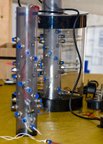Got waste? Feed it to the algae. Presto chango it's valuable.


For a healthier environment today, tomorrow and in the distant future: algae. That's the belief of Riggs Eckelberry, CEO of OriginOil, in Los Angeles. Sound like just another bodiesel start-up? No way, this is a company that sees itself at the vortex of a green revolution. I spoke with Eckelberry on the phone and he explained how algae is far more than just another contender for gasoline replacement.
First, algae is a quick, efficent, low capital expenditure approach to curtailing CO2 emissions. Eckelberry's firm is currently working on a entire system: hardware configuration, software apps, recipes, all you need to stop industrial CO2 output. The algae will take the CO2, digest it and spew forth methane which then can be burned to provide energy, and even more CO2. An algae powered generator can be run remotely, needing minimal on-site manpower.
SEE RAPID GROWTH Eckelberry sees this algae tech spreading rapidly across Europe where last year the E.U. tax on CO2 emissions quintupled. If you have a plate glass factory, cement plant, utility burning and fossil fuel, you need an algae tank that consumers that CO2. Turns waste into valuable resource. Eckelberry and I speculated that in the future there may be CO2 pipelines delivering the valuable gas to algae-driven utilities. Meanwhile, every major industry that generates CO2 or other organic gas emissions needs its friendly algae installation.
How confident is Eckelberry? "We'll provide the technology and there'll be a tornado of adoptions." He's seeing intense interest across Europe, from Japanese companies, and in far-flung development centers like Dubai and Mumbai. Why? The algae solution is localized, uses primarily off-the-shelf technology combined with know-how and process information from Origin Oil. They see their future as primarily one of the training and providing an ever-expanding knowledge base about algae and its applications. Piracy? Bring it on, says Eckelberry. He says piracy of Windows make Microsoft king of the operating system. Eckelberry sees the same thing happening with algae tech as it overwhelms the more costly, klunky tech now used to deal with manure, sawdust, CO2 emissions, all manner of industrial and agricultural waste. Got serious problems with fertilizer in run-off? Feed it to the algae. The little algae organisms love nitrates even more than CO2.
I recently blogged aout how natural algae blooms are feeding off our waste dumped into the oceans. It's good to learn we can take that natural procilivity of algae to thrive on our waste, and then use it for our own good and that of the planet. Like the first person who discovered milk turned into yogurt by unseen micro-organisms, or the lucky guy who first happend onto fermented grape juice and marvelled at the miracle. Eckelberry says current biomass power plants are highly wasteful. Biodiesel will eventually be more efficient if it's algae-based. Algae-driven plants will use water that is 90% recyclable. First, Eckelberry says the industrial on-site CO2 consumption by algae will drive his business. Any industry powered by a fossil fuel emits CO2 and thus needs what Eckleberry's algae can provide. Coal, natural gas, propane, LNG? There's an algae-based emissions solution. Then there'll be growth and development of utility-scale algae plants to generate large amounts of energy. Finally there'll be development of the small, portable systems for small business, backyards, small farms.
NEED ALGAE CLEAN ROOMS? I'm not a biologist so how do you keep these algae gizmos bubbling along? Pumping lots of tiny CO2 bubbles through the vat. Frequent changes of algae culture to keep the growth strong and "hungry." Go with the local species. He says there is no such thing as a pure algae culture and you learn to use what thrives in any locality. The worst natural enemy of the algae? Hungry rotifers, a phylum you first encountered in high school biology. Just clean the tank and add a new batch of algae and system bubbles right along.
A TREND, NOT A PRIVATE PASSION
Though Origin Oil has six patents already and expects more, Eckelberry is fine with his competition, figuring there's room for all in an industry he says can deal with so many of the urgent environmental problems we face. Also in California, Sapphire Energy and Solazyme are on parallel paths to developing algae apps. Sapphire Energy's goal is to the leading provider of renewable petrochemicals. Solazyme is in the Silicon Valley and its stated goal is to manufacture bioactive products. They are aimed at biomedical apps, as their website says "Solazyme is currently using algae to manufacture bioactive compounds for treatment of diabetes, heart disease, cancer and other select indications." [poll id="82"] Ten years ago "National Algae Association" would have been a brief skit on "Saturday Night Live." Now it's a vital, optimistic trade group.